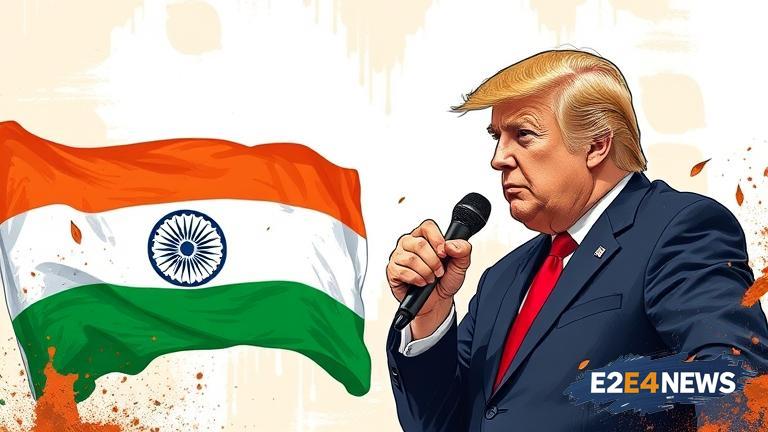The United States has issued a warning to India, stating that it will impose significant tariffs on the country if it continues to purchase oil from Russia. This move is seen as a response to India’s decision to maintain its oil imports from Russia, despite the ongoing conflict in Ukraine. The US has been critical of India’s stance on the issue, with President Trump stating that the country’s actions are unacceptable. The threat of tariffs has sparked concerns about the potential impact on the Indian economy, with many experts warning that it could lead to a significant increase in prices for consumers. The US has been trying to persuade India to reduce its dependence on Russian oil, but so far, the country has refused to budge. India has maintained that it will continue to prioritize its energy needs, even if it means going against the wishes of the US. The dispute has highlighted the complexities of the US-India relationship, with both countries having different priorities and interests. The US has been seeking to strengthen its ties with India, but the issue of Russian oil imports has created a significant obstacle. The Indian government has stated that it will not be intimidated by the US threat, and will continue to make decisions that are in the best interests of the country. The situation has sparked a heated debate, with many arguing that the US is trying to bully India into submission. Others have pointed out that the US has its own interests to protect, and that the threat of tariffs is a legitimate response to India’s actions. The dispute has also highlighted the role of other countries, such as China, which has been watching the situation with interest. China has been seeking to expand its own influence in the region, and the US-India dispute has created an opportunity for it to do so. The situation is complex, with many different factors at play. The US has been seeking to promote its own energy exports, and has been critical of India’s decision to purchase oil from Russia. India, on the other hand, has been seeking to diversify its energy sources, and has maintained that it will not be dictated to by the US. The dispute has sparked concerns about the potential impact on the global economy, with many experts warning that it could lead to a significant increase in prices for consumers. The situation is being closely watched, with many waiting to see how it will play out. The US has stated that it will continue to monitor the situation, and will take further action if necessary. India has maintained that it will not back down, and will continue to prioritize its energy needs. The dispute has highlighted the challenges of navigating complex geopolitical relationships, and the need for careful diplomacy. The situation is a reminder that the global economy is highly interconnected, and that actions in one part of the world can have significant impacts elsewhere. The US and India have a long history of cooperation, but the dispute over Russian oil imports has created a significant challenge. The situation is a test of the relationship between the two countries, and will require careful management to resolve. The US has stated that it values its relationship with India, but will not compromise on its principles. India has maintained that it will not be intimidated, and will continue to make decisions that are in the best interests of the country. The dispute has sparked a heated debate, with many arguing that the US is trying to assert its dominance over India. Others have pointed out that the US has its own interests to protect, and that the threat of tariffs is a legitimate response to India’s actions. The situation is complex, and will require careful diplomacy to resolve.
